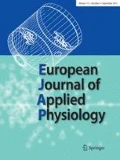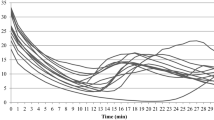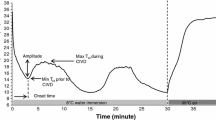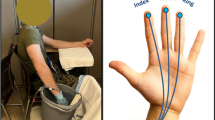Abstract
Cold-induced vasodilation (CIVD) in the finger tips generally occurs 5–10 min after the start of local cold exposure of the extremities. This phenomenon is believed to reduce the risk of local cold injuries. However, CIVD is almost absent during hypothermia, when survival of the organism takes precedence over the survival of peripheral tissue. Subjects that are often exposed to local cold (e.g. fish filleters) develop an enhanced CIVD response. Also, differences between ethnic groups are obvious, with black people having the weakest CIVD response. Many other factors affect CIVD, such as diet, alcohol consumption, altitude, age and stress. CIVD is probably caused by a sudden decrease in the release of neurotransmitters from the sympathetic nerves to the muscular coat of the arterio-venous anastomoses (AVAs) due to local cold. AVAs are specific thermoregulatory organs that regulate blood flow in the cold and heat. Their relatively large diameter enables large amounts of blood to pass and convey heat to the surrounding tissue. Unfortunately, information on the quantity of AVAs is lacking, which makes it difficult to estimate the full impact on peripheral blood flow. This review illustrates the thermospecificity of the AVAs and the close link to CIVD. CIVD is influenced by many parameters, but controlled experiments yield information on how CIVD protects the extremities against cold injuries.

Similar content being viewed by others
References
Adams T, Smith RE (1962) Effect of chronic local cold exposure on finger temperature responses. J Appl Physiol 17:317–322
Aschoff J (1944) Über der Kältedilation der Extremität des Menschen in Eiswasser [In German]. Pflugers Arch 248:183–196
Bader ME, Mead J (1949) The effect of local thermal influences on blood flow through the fingers in various states of body heat balance. Office of the Quartermaster General. Environmental Protection section. Report 159. Quartermaster Climatic Research Lab. US Navy.
Bartelink ML, De Wit A, Wollersheim H, Theeuwes A, Thien T (1993) Skin vascular reactivity in healthy subjects: influence of hormonal status. J Appl Physiol 74:727–732
Bergersen TK, Hisdal J, Walloe L (1999) Perfusion of the human finger during cold-induced vasodilation. Am J Physiol 276:R731–R737
Blaisdell RK (1951) Effect of body thermal state on cold-induced cyclic vasodilation in the finger. Report to the quartermaster general number 177. Quartermaster Climatic Research Lab. US Navy.
Bridgman SA (1991) Peripheral cold acclimatization in Antarctic scuba divers. Aviat Space Environ Med 62:733–738
Brown GM, Page J (1952) The effect of chronic exposure to cold on temperature and blood flow of the hand. J Appl Physiol 5:221–227
Burgess HJ, Sletten T, Savic N, Gilbert SS, Dawson D (2001) Effects of bright light and melatonin on sleep propensity, temperature, and cardiac activity at night. J Appl Physiol 91:1214–1222
Burton AC, Edholm OG (1955) Man in a cold environment. Edward Arnold, London
Carlson LD (1966) Method of estimating local tolerance to extreme cold. In: Yoshimura H, Weiner JS (eds) Human adaptability and its methodology. Proceedings of a Symposium, Kyoto, Japan. Japan Society for the Promotion of Sciences, pp 60–63
Carter SA (1978) Voluntary increase in finger temperature in man in a cooling environment. Can J Physiol Pharmacol 56:993–998
Chen F, Nilsson H, Holmér I (1994) Finger cooling by contact with cold aluminium surfaces – effect of pressure, mass and whole body thermal balance. Eur J Appl Physiol 69:55–60
Clara M (1939) Die arterio-venösen Anastomosen [In German]. Barth, Leipzig
Clark ER, Clark EL (1934) The new formation of arteriovenous anastomoses in the rabbit's ear. Am J Anat 54:229
Cleophas TJM, Fennis JFM, Van'tLaar A (1982) Finger temperature after a finger-cooling test: influence of air temperature and smoking. J Appl Physiol 52(5):1167–1171
Coffman JD (1972) Total and nutritional blood flow in the finger. Clin Sci 42:243–250
Cooke JP, Craeger MA, Osmundson PJ, Shepherd JT (1990) Sex differences in control of cutaneous blood flow. Circulation 82:1607–1615
Daanen HAM (1997) Central and peripheral control of finger blood flow in the cold. Thesis. Free University, Amsterdam, The Netherlands
Daanen HAM (2001) Cold injury risk of marines [in Dutch]. Report TM-A050. TNO Human Factors, Soesterberg
Daanen HAM, Ducharme MB (1999) Finger cold-induced vasodilation during mild hypothermia, hyperthermia and at thermoneutrality. Aviat Space Environ Med 70:1206–1210
Daanen HAM, Ducharme MB (2000) Axon reflexes in cold exposed fingers. Eur J Appl Physiol 81:240–244
Daanen HAM, Van Ruiten HJM (2000) Cold induced peripheral vasodilation at high altitudes – a field study. High Altitude Med Biol 1:323–329
Daanen HAM, Van de Linde FJG, Romet TT, Ducharme MB (1997) The effect of body temperature on the hunting response of the middle finger. Eur J Appl Physiol 76:538–543
Ducharme MB, Vanhelder WP, Radomski W (1991) Cyclic intramuscular temperature fluctuations in the human forearm during cold-water immersion. Eur J Appl Physiol 63:188–193
Ducharme MB, Greif R, Sessler DI, Doufas A, Mokhtarani M (2001) Forearm tissue temperature and the CIVD response. Proc Aust Physiol Pharmacol Soc 32(2) [Suppl.] 1:27P
Edwards M, Burton AC (1960) Correlation of heat output and blood flow in the finger, especially in cold-induced vasodilation. J Appl Physiol 15:201–208
Elkington EJ (1968) Finger blood flow in Antarctica. J Physiol (Lond) 199:1–10
Elsner RW (1963) Comparison of Australian aborigines, Alacaluf Indians, and Andean Indians. Fed Proc 22:840–842
Elsner RW, Nelms JD, Irving L (1960) Circulation of heat to the hands of Arctic Indians. J Appl Physiol 15:662–666
Fernández N, Monge L, García-Villalón AL, García JL, Gómez B, Diéguez G (1994) Cooling effects on nitric oxide production by rabbit ear and femoral arteries druing cholinergic stimulation. Br J Pharmacol 113:550–554
Folkow B, Fox RH, Krog J, Odelram H, Thorén O (1963) Studies on the reactions of the cutaneous vessels to cold exposure. Acta Physiol Scand 58:342–354
Fox RH, Wyatt HT (1962) Cold-Induced vasodilatation in various areas of the body surface of man. J Physiol (Lond) 162:289–297
Freedman RR, Sabharwal SC, Moten M, Migáli P (1992) Local temperature modulates α1- and α2-adrenergic vasoconstriction in men. Am J Physiol 263:H1197–H1200
García-Villalón AL, Monge L, Montoya JJ, García JL, Fernández N, Gómez B, Diéguez G (1992) Cooling and adrenergic response of rabbit ear and femoral artery: role of the endothelium. Br J Pharmacol 106:727–732
Gardner CA, Webb RC (1986) Cold-induced vasodilatation in isolated, perfused rat tail artery. Am J Physiol 251:H176–H181
Gasser P, Müller P, Mauli D, Stäubli C (1992) Evaluation of reflex cold provocation by laser doppler flowmetry in clinically healthy subjects with a history of cold hands. Angiology 43 (5):389–394
Gibbon JH, Landis EM (1932) Vasodilation in the lower extremities in response to immersing the forearms in warm water. J Clin Invest 11:1019–1036
Glaser EM, Whittow GC (1957) Retention in a warm environment of adaptation to localized cooling. J Physiol (Lond) 136:98–111
Graham TE, Lougheed MD (1985) Thermal responses to exercise in the cold: influence of sex differences and alcohol. Hum Biol 57 (4):687–698
Granberg PO (1991) Alcohol and cold. Arct Med Res 50 [Suppl. 6]:43–47
Grant RT, Bland E (1931) Observations on arterio-venous anastomoses in human skin and in the bird's foot with special reference to the reaction to cold. Heart 15:385–411
Gray H (2000) Anatomy of the human body. Lea and Febiger, Philadelphia, 1918; Bartleby.com, 2000
Greenfield ADM, Kernohan,GA, Marshall RJ, Shepherd JT, Whelan RF (1951) Heat loss from toes and fore-feet during immersion in cold water. J Appl Physiol 4:37–45
Guyton AC, Hall JE (1996) Textbook of medical physiology. WB Saunders, Philadelphia
Hale AR, Burch GE (1960) The arteriovenous anastomoses and blood vessels of the human finger. Morphological and functional aspects. Medicine 39:191–240
Halperin JL, Cohen RA, Coffman JD (1983) Digital vasodilation during mental stress in patients with Raynaud's disease. Cardiovasc Res 17:671–677
Hampton IFG (1969) Local acclimatization of the hands to prolonged cold exposure in the Antarctic. Brit Antarctic Surv Bull 19:9–56
Havenith G, Van de Linde FJG, Heus R (1992) Pain, thermal sensation and cooling rates of hands while touching cold materials. Eur J Appl Physiol 65:43–51
Hellström B, Andersen KL (1960) Heat output in the cold from hands of Arctic fishermen. J Appl Physiol 15:771–775
Heus R, Daanen HAM (1993) The influence of cold induced vasodilation on pain and thermal sensations of hand immersed in cold water In: Milton AS (ed) Thermal physiology 1993. Abstracts of the Proceedings of the IUPS Thermal Physiology Commission Symposium August 1993, Aberdeen, Scotland, UK
Hirai A, Tanabe M, Shido O (1991) Enhancement of finger blood flow response of postprandial human subjects to the increase in body temperature during exercise. Eur J Appl Physiol 62:221–227
Hirai K, Horvath SM, Weinstein V (1970) Differences in the vascular hunting reaction between Caucasians and Japanese. Angiology 21:502 – 510
Hirata K, Nagasaka T, Noda Y (1988) Partitional measurement of capillary and arteriovenous anastomotic blood flow in the human finger by laser-Doppler flowmeter. Eur J Appl Physiol 57:616–621
Hornyak ME, Naver HK, Rydenhag B, Wallin BG (1990) Sympathetic activity influences the vascular axon reflex in the skin. Acta Physiol Scand 139:77–84
Iampietro PF, Goldman RF, Buskirk ER, Bass DE (1959) Response of Negro and white males to cold. J Appl Physiol 14:798–800
Iida T (1949) Studies concerning vascular reaction to cold (Part 1). Physiological significance of vascular reaction to cold [In Japanese]. J Physiol Soc Jpn 11:73–78
Itoh S, Kuroshima A, Hiroshige T, Doi K (1970) Finger temperature responses to local cooling in several groups of subjects in Hokkaido. Jpn J Physiol 20:370–380
IUPS Thermal Commission (2001) Glossary of terms for thermal physiology. Jpn J Physiol 51 (2):245–280
Izumi H, Karita K (1991) Axon reflex vasodilation in human skin measured by a laser doppler technique. Jpn J Physiol 41:693–702
Jackson RL, Roberts DE, Cote R, McNeal P, Sharp MW, Fay JT, Kraus E, Rahman SA, Hamlet MP (1989) Psychological and physiological responses of blacks and caucasians to hand cooling. Report T20–89 US Army Research Institute of Environmental Medicine, Natick, Massachusetts
Jobe JB, Sampson JB, Roberts DE, Beetham WP (1982) Induced vasodilation as treatment for Raynaud's disease. Ann Intern Med 97 (5):706–709
Jobe JB, Goldman RF, Beetham WP (1985) Comparison of the hunting reaction in normals and individuals with Raynaud's disease. Aviat Space Environ Med 56:568–571
Johnson JM, Taylor WF, Shepherd AP, Park MK (1984) Laser-Doppler measurement of skin blood flow: comparison with plethysmography. J Appl Physiol 56 (3):798–803
Keatinge WR (1957) The effect of general chilling on the vasodilator response to cold. J Physiol (Lond) 139:497–507
Keatinge WR (1961) The return of blood flow to fingers in ice water after suppression by adrenaline or noradrenaline. J Physiol (Lond) 159:101–110
Keatinge WR (1970) Direct effect of temperature on blood vessels: their role in cold vasodilation. In: Hardy JD, Gagge AP, Stolwijk JAJ (eds) Physiological and behavioural temperature regulation. Charles C Thomas, Springfield, Ill.
Keatinge WR, Harman MC (1980) Local mechanisms controlling blood vessels. In: Monographs of the Physiological Society, 37, Chapter 8. Academic Press, London, pp 99–108
Khan J, Spence VA, Belch JJF (2002) Cutaneous vascular responses and thermoregulation in relation to age. Clin Sci 82:521–528
Kramer K, Schulze W (1948) Die Kältedilatation der Hautgefäβe. Pflugers Arch 250:141–170
Kregel KC, Seals DR, Callister R (1992) Sympathetic nervous system activity during skin cooling in humans: relationship to stimulus intensity and pain sensation. J Physiol 454:359–371
Kreh A, Anton F, Gilly H, Handwerker HO (1984) Vascular reactions correlated with pain due to cold. Exp Neurol 85:533–546
Krog F, Folkow B, Fox RH, Lange Andersen K (1960) Hand circulation in the cold of Lapps and North Norwegian fishermen. J Appl Physiol 15:654–658
LeBlanc J (1975) Man in the cold. Charles C Thomas, Springfield, Ill.
LeBlanc J, Hildes JA, Héroux O (1960) Tolerance of Gaspé fishermen to cold water. J Appl Physiol 15:1031–1034
Lee DT, Young AJ, Bogart JE, Pandolf KB (1996) Finger vasodilatory responses in 4°C water. FASEB J 10 (3):A212
Lewis T (1930) Observations upon the reactions of the vessels of the human skin to cold. Heart 15:177–208
Livingstone SD (1976a) Effect of vitamin C on cold-induced vasodilation. Lancet 7:319–320
Livingstone SD (1976b) Changes in cold-induced vasodilation during Arctic exercises. J Appl Physiol 40:455–457
Livingstone SD, Grayson J, Reed LD, Gordon D (1978) Effect of a local cold stress on peripheral temperatures of Inuit, Oriental, and Caucasian subjects. Can J Physiol Pharmacol 56:877–881
Livingstone SD, Nolan RW, Keefe AA (1989) Changes in cold tolerance during a 100 day polar ski expedition. In: Mercer JB (ed) Thermal physiology. Elsevier, Amsterdam
Magerl W, Szolcsányi J, Westerman RA, Handwerker HO (1987) Laser Doppler measurements of skin vasodilation elicited by percutaneous electrical stimulation of nociceptors in humans. Neurosci Lett 82:349–354
Marriott I, Marshall JM, Johns EJ (1990) Cutaneous vascular responses evoked in the hand by the cold pressor test and by mental arithmetic. Clin Sci 79:43–50
Masson P (1937) Les glomus neuro-vasculaires [In French]. Hermann, Paris
Mathew L, Purkayastha SS, Selvamurthy W, Malhotra MS (1977) Cold induced vasodilatation and peripheral blood flow under local cold stress in man at altitude. Aviat Space Environ Med 48:497–500
Meehan JP (1955) Individual and racial variations in a vascular response to a cold stimulus. Milit Med 116:330–334 [note that Fig. 2 and Fig. 3 have been reversed in the original article]
Meehan JP (1957) General body cooling and hand cooling. In: Protection and functioning of the hands in cold climates. National Academy of Sciences, National research council, Washington
Miller LK, Irving L (1962) Local reactions to air cooling in an Eskimo population. J Appl Physiol 17:449–455
Mills WJ, Dromeshauser RA, Hempel FG, Pozos RS (1986) The effect of ethanol on cold induced vasodilation. In: Lomax, Schönbaum, Veale (eds) Homeostasis and thermal stress, 6th International Symposium on Pharmacological Thermoregulation. Karger, Basel, pp 43–45
Moriya K, Nakagawa K (1990) Cold-induced vasodilatation of finger and maximal oxygen consumption of young female athletes born in Hokkaido. Int J Biometeorol 34:15–19
Nagasaka T, Hirata K, Nunomura T (1988) Partitional measurements of circulation can be made between capillaries and arteriovenous anastomoses in the human finger. Jpn J Physiol 38:67–75
Nelms JD, Soper DJG (1962) Cold vasodilation and cold acclimation in the hands of British fish filleters. J Appl Physiol 17:444–448
O'Brien C, Castellani JW, Young AJ (1999) Exertional fatigue alters cold-induced vasodilation. Med Sci Sports Exerc 31 (5) [Suppl.] abstract 894
Okuda A (1942) Studies on frostbite. 1. Effects of cooling on volume, skin temperature and microscopic skin changes of fingers and toes [In Japanese]. J Physiol Soc Jpn 7:505–516
Page J, Brown GM (1953) Effect of heating and cooling the legs on hand and forearm blood flow in the Eskimo. J Appl Physiol 5:753–758
Pickering GW (1932) The vasomotor regulation of heat loss from the skin in relation to external temperature. Heart 16:115–135
Pollock FE, Koman LA, Smith BP, Holden M, Russell GB, Poehling GG (1993) Measurement of hand microvascular blood flow with isolated cold stress testing and laser Doppler fluxmetry. J Hand Surg 18A:143–150
Purkayastha SS, Selvamurthy W, Ilavazhagan G (1992) Peripheral vascular response to local cold stress of tropical men during sojourn in the Arctic cold region. Jpn J Physiol 42:877–889
Purkayastha SS, Ilavazhagan G, Ray US, Selvamurthy W (1993) Responses of Arctic and tropical men to a standard cold test and peripheral vascular responses to local cold stress in the Arctic. Aviat Space Environ Med 64:1113–1119
Purkayastha SS, Sharma RP, Ilavazhagan G, Sridharan K, Ranganathan S, Selvamurthy W (1999) Effect of vitamin C and E in modulating peripheral vascular response to local cold stimulus in man at high altitude. Jpn J Physiol 49:159–167
Rapaport SI, Fetcher ES, Shaub HG, Hall JF (1949) Control of blood flow to the extremities at low ambient temperatures. J Appl Physiol 2:61–71
Reading JE, Roberts DE, Prusaczyk WK (1997) Gender differences in finger temperatures during cold air exposure. NHRC publication 97–37. Naval Health Research Center, San Diego, Calif.
Roddie IC (1983) Circulation to skin and adipose tissue In: Shepherd, JT, Abboud, FM (eds) Handbook of physiology, section 2. The cardiovascular system. Volume III: Peripheral circulation and organ blood flow. American Physiological Society, Bethesda, Md., pp 285–317
Savourey G, Barnavol B, Caravel J-P, Feuerstein C, Bittel JHM (1996) Hypothermic general cold adaptation induced by local cold acclimation. Eur J Appl Physiol 73:237–244
Sawada S (1996) Cold-induced vasodilation response of finger skin blood vessels in older men observed by using a modified local cold tolerance test. Indust Health 34:561–556
Sawada S, Araki S, Yokoyama K (2000) Changes in cold-induced vasodilatation, pain and cold sensation in fingers caused by repeated finger cooling in a cool environment. Indust Health 38 (1):79–86
Sendowski I, Savourey G, Besnard Y, Bittel J (1997) Cold induced vasodilation and cardiovascular responses in humans during cold water immersion of various upper limb areas. Eur J Appl Physiol 75:471–477
Sendowski I, Savourey G, Launay J-C, Besnard Y, Cottet-Emard J-M, Pequignot J-M, Bittel J (2000) Sympathetic stimulation induced by hand cooling alters cold-induced vasodilatation in humans. Eur J Appl Physiol 81:303–309
Sherman JL (1963) Normal arteriovenous anastomoses. Medicine 42:247–267
Spealman CR (1945) Effect of ambient air temperature and of hand temperature on blood flow in hands. Am J Physiol 145:218–222
Spurr GB, Hutt BK, Horvath SM (1955) The effects of age on finger temperature responses to local cooling. Am Heart J 50:551–555
Takano N, Kotani M (1989) Influence of food intake on cold-induced vasodilatation of finger. Jpn J Physiol 39:755–765
Takeoka M, Yanagidaira Y, Sakai A, Asano K, Fujiwara T, Yanagisawa K, Kashumura O, Ueda G, Wu T-Y, Zhang Y (1993) Effects of high altitudes on finger cooling test in Japanese and Tibetans at Qinghai Plateau. Int J Biometeorol 37:27–31
Tan K, Tregenza T (2002) Looking for the BLIP. Website www.gecdsb.on.ca/sub/projects /psl/senior/10vaso.htm
Tanaka M (1971a) Experimental studies on human reaction to cold – vascular hunting reaction of workers to cold. Bull Tokyo Med Dent Univ 18:169–177
Tanaka M (1971b) Experimental studies on human reaction to cold – Differences in the vascular hunting reaction to cold according to sex, season and environmental temperature. Bull Tokyo Med Dent Univ 18:269–280
Tenland T (1982) On laser Doppler flowmetry – methods and microvascular applications. Linköping Studies in Science and Technology Dissertations No. 83. Dept. of Biomedical Engineering. Linköping University, Linköping
Van Someren EJW, Raymann RJEM, Scherder EJA, Daanen HAM, Swaab DF (2002) Circadian and age-related modulation of thermoreception and temperature regulation: mechanisms and functional implications. Ageing Res Rev 1:721–778
Vanggaard L (1975) Physiological reactions to wet cold. Aviat Space Environ Med 46 (1):33–36
Werner J (1977) Influences of local and global temperature stimuli on the Lewis-reaction. Pflugers Arch 367:291–294
Werner J (1983) Influences of rate of temperature change on effector mechanisms in human thermoregulation. J Therm Biol 8:51–54
Westerman RA, Low A, Pratt A, Hutchinson JS, Szolcsányi J, Magerl W, Handwerker HO, Kozak WM (1987) Electrically evoked skin vasodilation: a quantitative test of nociceptor function in man. Clin Exp Neurol 23:81–89
Wilson O, Goldman RF (1970) Role of air temperature and wind in the time necessary for a finger to freeze. J Appl Physiol 29:658–664
Wollersheim HCH (1988) Raynaud's phenomenon – clinical, patho-physiological and therapeutical studies. Thesis. University of Nijmegen, The Netherlands
Wyndham CH, Plotkin R, Munro A (1964) Physiological reactions to cold of men in the Antarctic. J Appl Physiol 19:593–597
Yoneyama S, Hashimoto S, Honma K (1999) Seasonal changes of human circadian rhythms in Antarctica. Am J Physiol 277:R1091–R1097
Yoshimura H (1960) Acclimatization to heat and cold. In: Essential problems in climatic physiology. Nankodo, Tokyo
Yoshimura H (1966) A comment for the method of estimating peripheral tolerance to extreme cold. In: Yoshimura H, Weiner JS (eds) Human adaptability and its methodology. Proceedings of a Symposium, Kyoto, Japan. Japan Society for the Promotion of Sciences, pp 64–66
Yoshimura H, Iida T (1950) Studies on the reactivity of skin vessels to extreme cold. Part I. A point test on the resistance against frostbite. Jpn J Physiol 1:147–159
Yoshimura H, Iida T (1952) Studies on the reactivity of skin vessels to extreme cold. Part II. Factors governing the individual difference of the reactivity, or the resistance against frostbite. Jpn J Physiol 2:177–185
Yoshimura H, Iida T, Koishi H (1952) Studies on the reactivity of skin vessels to extreme cold. Part III. Effects of diets on the reactivity of skin vessels to cold. Jpn J Physiol 2:310–315
Yoshimura H, Oshiba S, Masuko K (1958) Vascular reaction to cold – additional research [In Japanese]. J Kyoto Pref Med Univ 64:183–186
Acknowledgements
The author is indebted to Dr. M.B. Ducharme, Professor Dr. G.W.J.M. Tangelder, Professor Dr. R.S. Reneman, M. Simons, MD and Dr. W.A. Lotens for the review of the manuscript.
Author information
Authors and Affiliations
Corresponding author
Rights and permissions
About this article
Cite this article
Daanen, H.A.M. Finger cold-induced vasodilation: a review. Eur J Appl Physiol 89, 411–426 (2003). https://doi.org/10.1007/s00421-003-0818-2
Accepted:
Published:
Issue Date:
DOI: https://doi.org/10.1007/s00421-003-0818-2




